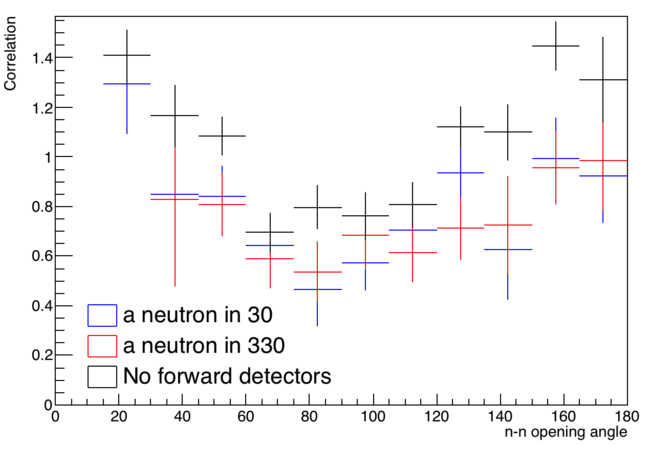Difference between revisions of "2NCorr Forward Detectors"
| (5 intermediate revisions by the same user not shown) | |||
| Line 1: | Line 1: | ||
[[Production Analysis| go back]] | [[Production Analysis| go back]] | ||
| + | There were concerns over the usefulness of events in the forward detectors, since there is no separation between photons and neutrons in the ToF spectrum. However, any accidentals, whether they are a result of noise, neutrons, photons, ect, can be subtracted out of the data by using the different pulse data. In order to check if reasonable results can be extracted from events in the forward detectors, I looked at the two-neutron opening angle distributions with the requirement that one of the neutrons was detected by detector 30, and detector 330. Both forward detectors produce an opening angle distribution that is quit similar to the distribution produced by the rest of the detector array. The inclusion of both forward detectors brought the number of two-neutron coincidence events from 2917 to 4506, or a 50% increase in statistics. | ||
| − | + | [[File:2NCorrForwardDetCompare.png|650px]] | |
| − | |||
| − | |||
| Line 11: | Line 10: | ||
[[Production Analysis| go back]] | [[Production Analysis| go back]] | ||
| + | . | ||
Latest revision as of 18:04, 22 February 2018
There were concerns over the usefulness of events in the forward detectors, since there is no separation between photons and neutrons in the ToF spectrum. However, any accidentals, whether they are a result of noise, neutrons, photons, ect, can be subtracted out of the data by using the different pulse data. In order to check if reasonable results can be extracted from events in the forward detectors, I looked at the two-neutron opening angle distributions with the requirement that one of the neutrons was detected by detector 30, and detector 330. Both forward detectors produce an opening angle distribution that is quit similar to the distribution produced by the rest of the detector array. The inclusion of both forward detectors brought the number of two-neutron coincidence events from 2917 to 4506, or a 50% increase in statistics.
go back .
